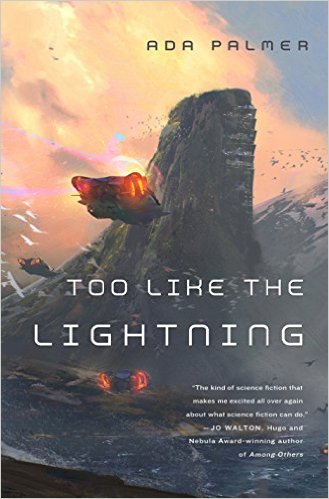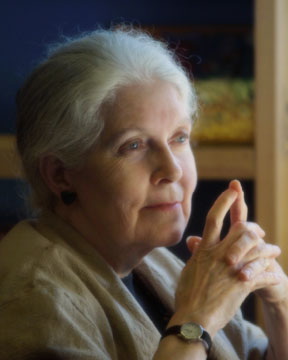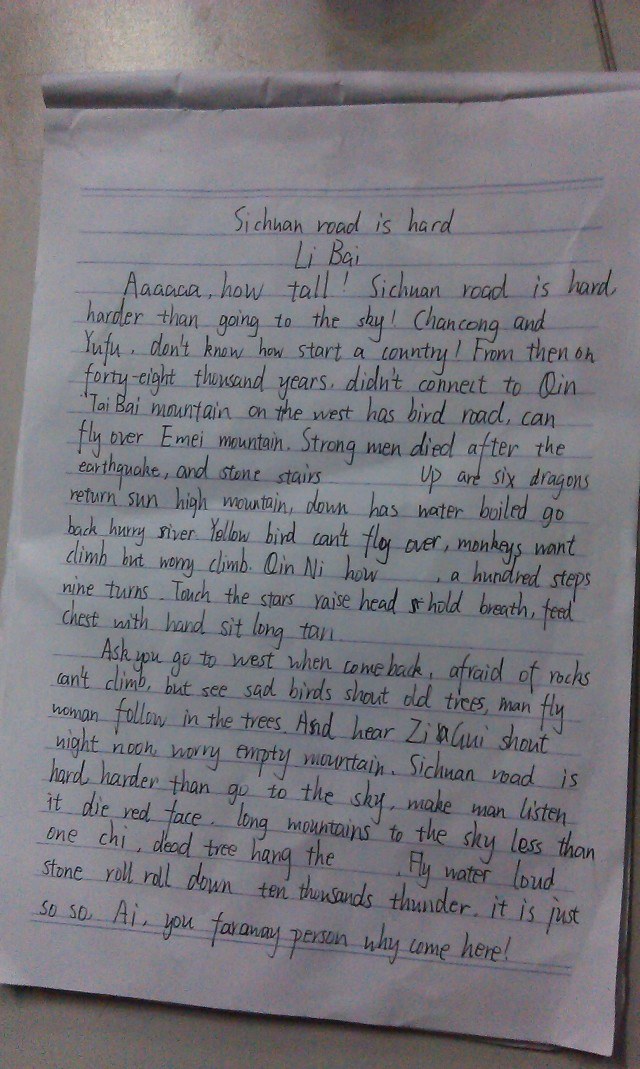Archive for Language and literature
May 18, 2016 @ 5:46 am· Filed by Mark Liberman under Language and literature, Psychology of language
Is this the future of English pronouns? Ada Palmer's Too Like the Lightning takes place in a world where he/she is as quaintly obsolete as thee/thou. From the book's opening:
 You will criticize me, reader, for writing in a style six hundred years removed from the events I describe, but you came to me for explanation of those days of transformation which left your world the world it is, and since it was the philosophy of the Eighteenth Century, heavy with optimism and ambition, whose abrupt revival birthed the recent revolution, so it is only in the language of the Enlightenment, rich with opinion and sentiment, that those days can be described. You must forgive me my ‘thee’s and ‘thou’s and ‘he’s and ‘she’s, my lack of modern words and modern objectivity. It will be hard at first, but whether you are my contemporary still awed by the new order, or an historian gazing back at my Twenty-Fifth Century as remotely as I gaze back on the Eighteenth, you will find yourself more fluent in the language of the past than you imagined; we all are.
You will criticize me, reader, for writing in a style six hundred years removed from the events I describe, but you came to me for explanation of those days of transformation which left your world the world it is, and since it was the philosophy of the Eighteenth Century, heavy with optimism and ambition, whose abrupt revival birthed the recent revolution, so it is only in the language of the Enlightenment, rich with opinion and sentiment, that those days can be described. You must forgive me my ‘thee’s and ‘thou’s and ‘he’s and ‘she’s, my lack of modern words and modern objectivity. It will be hard at first, but whether you are my contemporary still awed by the new order, or an historian gazing back at my Twenty-Fifth Century as remotely as I gaze back on the Eighteenth, you will find yourself more fluent in the language of the past than you imagined; we all are.
Read the rest of this entry »
Permalink
April 23, 2016 @ 9:51 pm· Filed by Victor Mair under Language and biology, Language and culture, Language and literature
A few days ago, we looked at a propaganda poster in Beijing: "'Dangerous love'" (4/19/16).
In continuing research on this poster, I discovered that at one site where it was pasted on the wall, there was an enigmatic sequence of lines on another piece of paper pasted on the wall just to the right of the 16-panel poster that the whole world was talking about:

Sources: here and here (close-up).
Read the rest of this entry »
Permalink
March 16, 2016 @ 3:12 pm· Filed by Mark Liberman under Language and literature
Geoff Pullum to me:
What the hell is going on with all the years except 1920 being labeled "11 PM"? [link]
Me to Geoff Pullum:
You mean on the x axis? I'm not seeing it — must be a special feature for Scottish readers.
Geoff Pullum to me:
Yep. 1920 11 PM 11 PM 11 PM 11 PM 11 PM 11 PM 11 PM 11 PM 11 PM on the x axis. Corresponds to decades. It's not Scots dialect: 1930 is known here as "1930".
Read the rest of this entry »
Permalink
January 9, 2016 @ 8:54 pm· Filed by Victor Mair under Language and culture, Language and education, Language and literature, Vernacular
From December 13-17, 2015, I participated in an international workshop at the Israel Institute for Advanced Studies (IIAS) on the Edmond J. Safra campus of Hebrew University in Jerusalem. The title of the workshop was "A Lasting Vision: Dandin’s Mirror in the World of Asian Letters". Here's the workshop website.
The workshop was about Sanskrit poetics, especially as detailed in the Kāvyādarśa (simplified transliteration: Kavyadarsha; Mirror of Poetry) of Daṇḍin (circa AD 7th c.), the earliest surviving systematic treatment of poetics in Sanskrit.
Read the rest of this entry »
Permalink
January 5, 2016 @ 5:29 pm· Filed by Victor Mair under Language and literature, Language and politics, Language on the internets
Lu Xun (1881-1936) is generally regarded as the greatest Chinese writer of the twentieth century. Despite his tremendous reputation and enormous influence through the 70s and into the 80s, in recent decades Lu Xun had fallen somewhat into disfavor as the CCP (Chinese Communist Party), which transformed itself into what I call the CCCCMMMMPPPP (Chinese Communist Christo-Confucian Marxist Maoist Militant Mercantilist Propagandistic Pugnacious Plutocratic Party), no longer took kindly his radical critique of corrupt, feudalistic society.
Read the rest of this entry »
Permalink
December 2, 2015 @ 3:27 pm· Filed by Geoffrey K. Pullum under Announcements, Books, Esthetics, Humor, Language and literature, Silliness, Writing
I'm pleased to be able to announce on Language Log the winner of the Literary Review's 2015 Bad Sex in Fiction Award. The award went to the singer Morrissey for his debut novel List of the Lost. And it seems to have been honestly earned. The judges cited this sentence:
Eliza and Ezra rolled together into the one giggling snowball of full-figured copulation, screaming and shouting as they playfully bit and pulled at each other in a dangerous and clamorous rollercoaster coil of sexually violent rotation with Eliza's breasts barrel-rolled across Ezra's howling mouth and the pained frenzy of his bulbous salutation extenuating his excitement as it whacked and smacked its way into every muscle of Eliza's body except for the otherwise central zone.
Read the rest of this entry »
Permalink
October 20, 2015 @ 7:56 am· Filed by Mark Liberman under Computational linguistics, Language and gender, Language and literature
I read Ancillary Justice, the first book in Ann Leckie's Imperial Radch series, at some point in the spring of 2014, and so I was not at all surprised to find Brad DeLong referring to her as "an extremely sharp observer […] author of the devastatingly-good Ancillary Justice", in a blog post "Ann Leckie on David Graeber's "Debt: The First 5000 Mistakes": Handling the Sumerian Evidence Smackdown", 11/24/2014, where he quotes at length from her blog post "Debt", 2/24/2013.
And if you haven't read Ann Leckie's trilogy, you should do yourself a favor and start doing so right away. But this is Language Log, not Science Fiction Book Review Log or Unreliable Economic History Log, so why am I bringing up Ann Leckie now?
Read the rest of this entry »
Permalink
August 18, 2015 @ 6:56 am· Filed by Victor Mair under Language and literature, Language and medicine
Don't jump to any conclusions based on the title. This post is not about how reading German crime novels raises blood pressure. Quite the contrary, it is about how reading German crime novels dramatically lowers blood pressure, at least for one of my friends.
Read the rest of this entry »
Permalink
February 5, 2015 @ 4:12 pm· Filed by Ben Zimmer under Language and literature, Obituaries
 Suzette Haden Elgin, a linguist and feminist science fiction writer, died on January 27 at the age of 78. From io9:
Suzette Haden Elgin, a linguist and feminist science fiction writer, died on January 27 at the age of 78. From io9:
Suzette Haden Elgin, who died last week, was a pioneer of using linguistics in science fiction, creating a whole constructed language in her novel Native Tongue. She was a giant of feminist SF. And she helped bring SF poetry to prominence, while also teaching us to defend ourselves with wit rather than bile.
Elgin had a PhD in linguistics, so it's no surprise that her Native Tongue book trilogy is all about language. The book takes place in a dystopian future, where women have been stripped of all rights when the 19th Amendment to the U.S. Constitution was repealed in 1996. A group of women, who work as part of a corps of linguists who help to communicate with alien races, develop a new secret language for women to use as part of their resistance to their oppression. This language is called Láadan, and Elgin has a whole vocabulary and syntax on her website.
Read the rest of this entry »
Permalink
April 19, 2014 @ 6:42 pm· Filed by Mark Liberman under Language and literature
I recently read Peter Brooks' "The Strange Case of Paul de Man", NYRB 4/3/2014, which is a review of The Double Life of Paul de Man by Evelyn Barish. Brooks' central argument seems to be that it's unfair to call de Man a fascist thief, because he was really just a charismatic sociopath. But the thing that caught my eye was a reference to an essay by de Man that I hadn't read:
He began teaching Reuben Brower’s famous course in Harvard’s General Education program, “Humanities 6: Introduction to Literature,” which had a transformative effect on his own approach to literature, as he noted in one of his last published essays, “The Return to Philology.”
Read the rest of this entry »
Permalink
April 4, 2014 @ 1:35 pm· Filed by Victor Mair under Language and education, Language and literature, Lost in translation
Wei Shao sent me this photograph of the English translation of a famous Chinese poem:

(Click to embiggen.)
Read the rest of this entry »
Permalink
March 10, 2014 @ 2:11 pm· Filed by Victor Mair under Humor, Language and literature
In "Doubletalk of the month", Mark Liberman presents a virtuoso display of a woman skillfully mimicking the sounds and intonations of numerous languages. You can do this kind of imitation with written forms as well.
Read the rest of this entry »
Permalink
October 4, 2013 @ 1:00 pm· Filed by Victor Mair under Classification, Etymology, Language and literature, Writing
Andrew Shields encountered the idea — on Facebook and vigorously promoted on this blog — that the Chinese character for poetry, shī 诗, consists of two parts meaning "word" and "temple". Furthermore, it is claimed that this is a particularly apt way to represent the notion of poetry, one that is conspicuously missing in Western culture.
Such a facile interpretation commits several fallacies, the chief of which is to misunderstand the history and nature of the character in question. After a careful examination of the evidence, it seems far more likely that shī 诗 has to do with the ritual performance of the odes by eunuchs, i.e., by reciters or singers who were castrati, than that it means "word" + "temple".
Read the rest of this entry »
Permalink
 You will criticize me, reader, for writing in a style six hundred years removed from the events I describe, but you came to me for explanation of those days of transformation which left your world the world it is, and since it was the philosophy of the Eighteenth Century, heavy with optimism and ambition, whose abrupt revival birthed the recent revolution, so it is only in the language of the Enlightenment, rich with opinion and sentiment, that those days can be described. You must forgive me my ‘thee’s and ‘thou’s and ‘he’s and ‘she’s, my lack of modern words and modern objectivity. It will be hard at first, but whether you are my contemporary still awed by the new order, or an historian gazing back at my Twenty-Fifth Century as remotely as I gaze back on the Eighteenth, you will find yourself more fluent in the language of the past than you imagined; we all are.
You will criticize me, reader, for writing in a style six hundred years removed from the events I describe, but you came to me for explanation of those days of transformation which left your world the world it is, and since it was the philosophy of the Eighteenth Century, heavy with optimism and ambition, whose abrupt revival birthed the recent revolution, so it is only in the language of the Enlightenment, rich with opinion and sentiment, that those days can be described. You must forgive me my ‘thee’s and ‘thou’s and ‘he’s and ‘she’s, my lack of modern words and modern objectivity. It will be hard at first, but whether you are my contemporary still awed by the new order, or an historian gazing back at my Twenty-Fifth Century as remotely as I gaze back on the Eighteenth, you will find yourself more fluent in the language of the past than you imagined; we all are.

